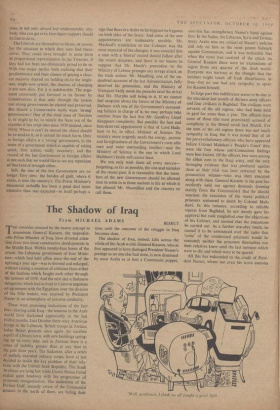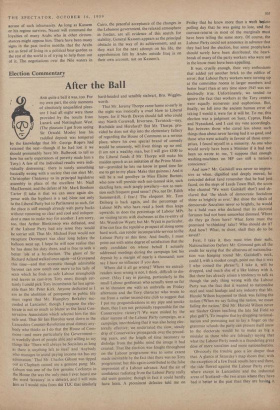The Shadow of Iraq
From MICHAEL ADAMS BEIRUT Ttit anxieties aroused by the recent attempt to assassinate General Kassem, the unpredict- able Prime Minister of Iraq, have diverted atten- tion from two more constructive developments in the Middle East. Within twenty-four hours of the attack, the Lebanese government of four Minis- ters—which had held office since the end of the uprising a year ago—was re-formed and enlarged, without raising a murmur of criticism from either of the factions which fought each other through the summer of 1958. And the next day a Sudanese delegation, which had arrived in Cairo to negotiate an agreement with the Egyptians over the division of the Nile waters, was received by President Nasser in an atmosphere of extreme cordiality.
These were promising indications of the fact that—leaving aside Iraq—the tensions in the Arab world have slackened appreciably in the last twelve months. Last October there were American troops in the Lebanon, British troops in Jordan; today Beirut Presents once again the carefree aspect of a boom town, with new buildings spring- ing up on every side; and in Amman there is a sense of stability greater than at any time in the past three years. The Sudanese, after a series of politely executed military coups, have at last decided to tackle the key problem of their rela- tions with the United Arab Republic. The Saudi Arabians are lying low while Crown Prince Feisal makes quiet headway with his programme of economic reorganisation. The sheikdoms of the Persian Gulf, uneasily aware of the Communist menace to the north of them, are biding their time until the outcome of the struggle in Iraq becomes clear.
The shadow of Iraq, indeed, falls across the whole of the Arab world. General Kassem, who at first appeared to have damaged President Nasser's prestige as no one else had done, is now dismissed by most Arabs as at best a Communist puppet, and this has strengthened Nasser's hand against him. In the Sudan, the Lebanon, Syria and Jordan, many Arabs who are critical of Nasser's policies still rely on him as the most potent bulwark against Communism, and it was noticeable that when the news was received of the attack on General Kassem there were no expressions of regret from any quarter of the Arab world. Everyone was nervous at the thought that the incident might touch off fresh disturbances in Iraq—but no one had any sympathy to spare for Kassem himself.
In large part this indifference seems to be due to the execution last month of thirteen army officers and four civilians in Baghdad. The civilians were servants of the old regime, who had been held in gaol for more than a year. The officers Nvere some of those (the most prominent) accused of complicity in the Mosul revolt last March. For the men of the old regime there was not much sympathy in Iraq, but it was noted that of all the pre-revolutionary otlicials who have appeared before Colonel Mandawi's 'People's Court' they were the four whose anti-Communist feelings were best known. Of the officers, two were among the ablest men in the Iraqi army, and the only damaging evidence that was produced against them at their trial was later retracted by the prosecution witness—who was then executed along with them. General Kassem in the past has resolutely held out against demands (coming mainly from the Communists) that he .should sanction the execution of the many political prisoners sentenced to death by Colonel Mah- dawi. In this instance, according to reliable reports from Baghdad, he not merely gave his approval but rode roughshod over the objections of his Cabinet, and insisted that the executions be carried out. As a further macabre touch, he caused it to be announced over the radio that 'some' of the condemned prisoners would be executed; neither the prisoners themselves nor their relatives knew until the last moment which were to die and which were to be spared.
All this has redounded to the credit of Presi- dent Nasser, whom not even his worst enemies accuse of such inhumanity. As long as Kassem or his regime survives, Nasser will command the loyalties of many Arabs who in other circum- stances might oppose him. There have been many signs in the past twelve months that the Arabs are as tired of living in a political bear-garden as the rest of the world is of trying to help them out of it. The negotiations over the Nile waters in Cairo, the peaceful acceptance of the changes in the Lebanese government, the relaxed atmosphere in Jordan, are all evidence of this search for stability. General Kassem appears as the principal obstacle in the way of its achievement, and as they wait for the next attempt on his life, the apprehension felt by Arabs outside Iraq is on their own account, not on Kassem's.







































 Previous page
Previous page